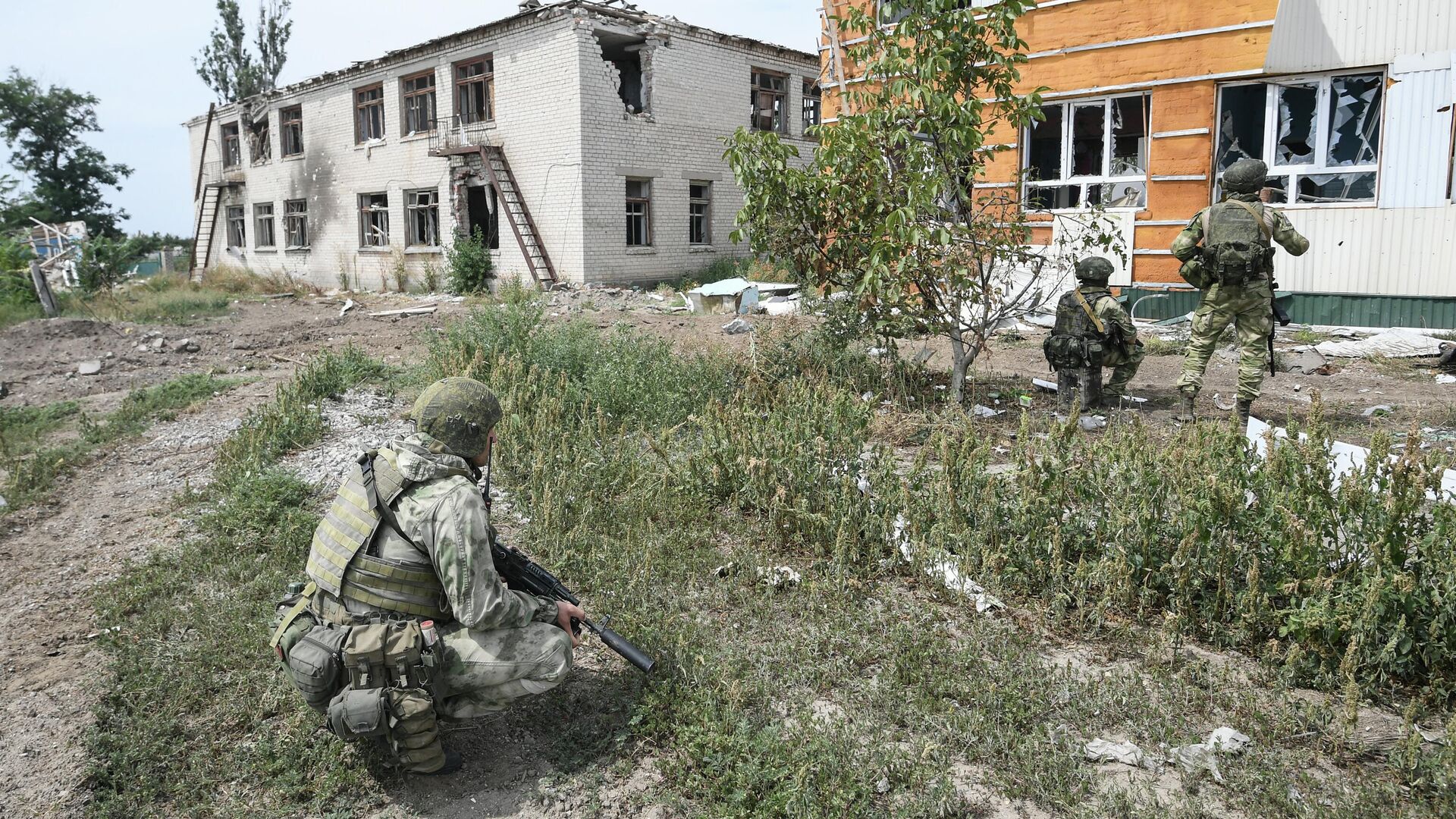World Economy Would Surge if Ukraine Conflict Ended, Russia Sanctions Lifted: Ex-Lawmaker
05:18 GMT 10.11.2022 (Updated: 10:59 GMT 11.03.2024)

© Sputnik / Konstantin Mikhailchevsky
/ Subscribe
WASHINGTON (Sputnik) - The world economy would surge if the Ukraine conflict ended and the sanctions imposed against Moscow were lifted, former Virginia State Senator Richard Black told Sputnik.
"One of the things very few people think about, but if this war went away, and if the sanctions were lifted, the world economy would surge," Black said. "All of a sudden, countries all around the world would increase their prosperity, inflation would drop. And a big part of that is because Russia is an enormous exporter of natural resources. And they're the number one exporter of wheat, fertilizer, of lumber of natural gas. They're a huge exporter of oil, of aluminum, of titanium, of gold. Just a tremendous number of products."
Black went on to say that Russia has traditionally supplied almost half of Europe's diesel fuel for running their construction equipment, buses, and trucks.
"The ability to trade back and forth is so important between Russia and Europe and the idea that somehow they would be at war is really quite insane," the former lawmaker said. "But right now we're led by people who are not very rational. I know that Russia would entertain these talks at any moment. I mean, they made it quite clear, but they're always open for talks. And it's really the NATO powers that push."
Black went on to say that it is also NATO that is constantly using propaganda false flag attacks like the one in Bucha when they claimed that the Russians, who were withdrawing, had killed a lot of people.
Black stressed, however, that there's a growing number of people who are very strong supporters of peace and opponents of war, and expressed hope that those people gain more influence.
"It's always been my thought that the ideal template for peace in Ukraine would be the same thing that was done during the Cold War, when there was an agreement between the Soviet Union and the other Allied powers - the United States, Great Britain and France, and they all agreed to demilitarize Austria," he noted. "In 1955 what they did is all of those occupying powers withdrew their forces from Austria, and in exchange, Austria, changed its constitution and said that they would forever be a neutral nonbelligerent country. They also said that they would never allow foreign troops to be stationed inside of Austria."
Black recalled that he was with the United States Army in Europe in the early 80s, when there was tremendous tension all along the east west border. He shared that then he took his wife and children and they drove into Austria.
"We didn't know what to expect, but we thought that would sort of be a high level of tension," he said. "They waved us through, checked ID and, and I discovered here was Austria and they were celebrating Christmas. People were joyous and happy. The Cold War didn't exist in Austria. There was no threat of anybody attacking them from either side. But it has to be guaranteed by the Soviet Union and by the United States, Great Britain and France."
Black said that would be the ideal situation.
"I don't know whether that can ever be achieved. But I think there was some movement in that direction," he added. "Two months after Russia crossed the border into Ukraine... then Ukraine and Russia began to talk peace. And they had arranged a framework for peace and they had almost achieved peace, when Prime Minister Boris Johnson flew unexpectedly and basically ordered Ukraine not to make peace and to continue war. He never would have done that without coordination with the White House."
"I don't know whether that can ever be achieved. But I think there was some movement in that direction," he added. "Two months after Russia crossed the border into Ukraine... then Ukraine and Russia began to talk peace. And they had arranged a framework for peace and they had almost achieved peace, when Prime Minister Boris Johnson flew unexpectedly and basically ordered Ukraine not to make peace and to continue war. He never would have done that without coordination with the White House."
The prospects for peace in Ukraine will improve if Republicans control the House of Representatives, Richard Black added.
House Minority Leader Kevin McCarthy is expected to become the House speaker in the next term of Congress with the Republicans projected to win a narrow majority after Tuesday's midterms. He is reportedly moving quickly to secure enough votes in the Republican Party to be nominated, however, the Republican Freedom Caucus might stand in his way, media reported.
"If [House Speaker Nancy] Pelosi loses control of the House - in other words, she's not the speaker of the house - she is a very powerful, bloodthirsty voice for war, and so if the Republicans get control, regardless of who ends up being the speaker, then it will be tremendously better [for] the cause of peace," Black said.
McCarthy has previously said that Republicans will not provide Ukraine with limitless funding if Republicans take control of the House.
"I think that his comment where he said that Ukraine will not get a blank check in the future, I think he was sort of campaigning for the support of these conservatives [in the Republican party]," Black said. "McCarthy seems to be talking as though he was receptive to do some cuts to the Ukraine funding."
US media reported on Wednesday that the United States and other allies believe Ukraine will not be able to achieve all of its goals on the battlefield and is nudging Kiev to enter peace talks with Russia this winter to resolve the ongoing conflict.
Black said the Biden administration's appearance of encouraging negotiations between Ukraine and Russia is political posturing, but he did not rule out that US lawmakers may be able to start making some changes towards peace.
"I think there will be some talk of negotiations that will be totally an illusion, just a smokescreen, but at the same time there are other elements within the Republican Party, and at some point, there may be some elements of the Democrat party, that would start to oppose the war," Black said.
Black did point out that the lack of the anticipated red wave in the midterm elections was a setback for the cause of peace in Ukraine and does not expect the new Congress to have much impact on the Russia-Ukraine conflict.
"I don't know whether there will be enough pressure on Biden to cause him to actually take some action," Black said. "I certainly wish that there was more pressure from Europe, but right now they seem to be almost under the total dominance of the United States."
The Europeans, Black added, should have a little bit more backbone to dictate what happens in Ukraine.
Black said he also believes Germany should show more independence from the United States, adding that they allowed the Nord Stream pipelines to be sabotaged by the United Kingdom in close coordination with the White House.
Black also said former President Donald Trump would have been able to negotiate with Russian President Vladimir Putin to address his concerns related to Ukraine in order to avoid a conflict, Black said.
US Republican lawmakers, skeptical of providing funding for Ukraine, will unlikely be able to end it, however, if they win control of the House of Representatives, they may slow it down, Richard Black said.
"I do know that there are elements within the House that are growing in strength that are skeptical of funding for the Ukraine war," Black said. "I'd be surprised if they're able to cut off the funding, but I think that the funding will perhaps slow down as a result of the Republicans if they win the House."
Black said the Speaker of the House, who is determined by a vote of the caucus, has enormous power.
"If the Republicans have the majority, then they will select the speaker. The speaker has tremendous control over what happens with legislation. The speaker also appoints all of the committee chairmen who have a tremendous amount of power over the agenda, and what will advance and which ones are killed off in committee," he said. "If you look at the situation right now, where you have Nancy Pelosi as a speaker, she operated with a very, very slender majority. There are 435 seats in the house, and she only had an eight seat majority, but very, very small. But she was able to wield enormous power because she controlled all of the valves that controlled the flow of things through the house."
Black said it is not entirely clear how powerful the new Republican Speaker will be.
"If the Republicans have the majority, then they will select the speaker. The speaker has tremendous control over what happens with legislation. The speaker also appoints all of the committee chairmen who have a tremendous amount of power over the agenda, and what will advance and which ones are killed off in committee," he said. "If you look at the situation right now, where you have Nancy Pelosi as a speaker, she operated with a very, very slender majority. There are 435 seats in the house, and she only had an eight seat majority, but very, very small. But she was able to wield enormous power because she controlled all of the valves that controlled the flow of things through the house."
Black said it is not entirely clear how powerful the new Republican Speaker will be.
"However, the Republicans will exert an enormous amount of influence if they do end up controlling the House as I expect they will. So they may not do radical things like the Democrats have done. They may try to sort of take compromised positions. I don't know that will sort of depend on the leadership," he added.
Republicans appear to have won enough seats during Tuesday's midterm elections to take control of the House while the Senate remains up for grabs with three races still too close to call. Republican House Leader Kevin McCarthy is expected to replace Nancy Pelosi as Speaker when the next Congress convenes in January.


